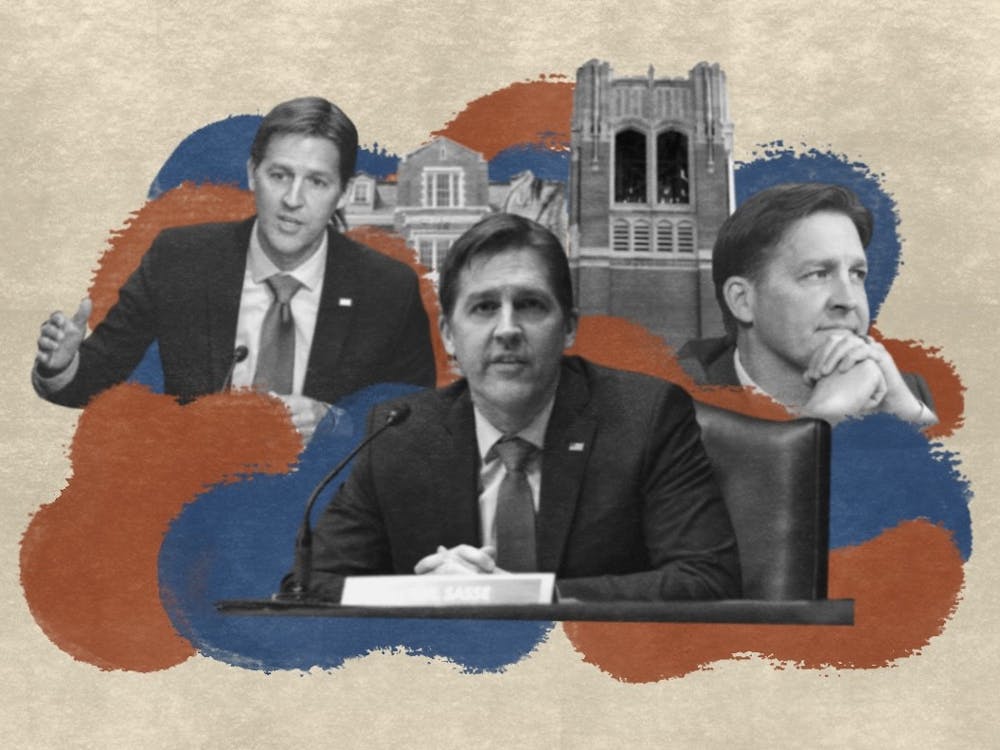UF administration claims Nebraska Sen. Ben Sasse is “an academic first,” despite his nine years in politics. Yet, as Sasse states himself in his online biography, he’s simply “an occasional professor.”
Because Sasse dedicated his academic career to studying American history, UF history department faculty and students are curious to see how the senator will fit into their college.
Jon Sensbach, UF history department chair, said Sasse has yet to show his interest in involving himself in the college. A teaching collaboration with the former senator could be an interesting prospect for some students, he said.
The department would welcome Sasse if he were interested in teaching a class about the history of Congress from his own experience, Sensbach said.
Kenny Tant, a 29-year-old UF history senior, said he’s excited for the possibility of Sasse moving UF’s history department into the spotlight through his presidency. Tant thinks the history department deserves more recognition, he said.
“I don’t think a lot of people know that there are a lot of nationally recognized experts in history that work here,” Tant said.
He hopes Sasse could bring opportunities to the department if he’s confirmed and becomes involved in the department.
“It would be interesting to see more grants and funds put into the history department,” Tant said.
Chronicling Sasse’s academics
UF administration and Sasse’s supporters have pointed to his PhD in history from Yale University as a testament to his academic expertise.
Sasse also graduated with his bachelor's degree in government from Harvard University and his master’s in liberal studies from St. John's College, according to Forbes Magazine.
At Yale, Sasse’s nearly 500-page history dissertation examined the history of secular Democrats and anti-secular Republicans during the presidencies of Richard Nixon and Ronald Reagan.
Later on, Sasse taught as an assistant professor at the Lyndon B. Johnson School of Public Affairs at The University of Texas at Austin full-time in 2005. He then shuffled between roles at the U.S. Department of Homeland Security and the U.S. Department of Health and Human Services before leaving the university in 2010 for another university’s presidency.
He served as the president of Midland University — a private Lutheran college in Fremont, Nebraska. Sasse was president for five years before starting his campaign for the U.S. Senate in 2013.
Steven Noll, a UF history professor, said he worries Sasse’s time as Midland’s president might not translate well to the work cut out for him at UF.
Sasse’s position as a politician doesn’t necessarily make him unqualified to be university president, he said, but Sasse’s brief history at Midland is a fragile qualification for the role.
“Don’t tell us he’s [an] academic, because he’s not an academic,” Noll said. “To say he's well qualified because he's been a president of a small, private, church-related school in the middle of Nebraska — it wouldn’t be something that would qualify him to make the final pool.”
Compared to UF’s two previous presidents, Noll said, Sasse’s teaching position at the University of Texas isn’t on the same level as former President Bernie Machen or President Kent Fuchs.
Fuchs’ and Machen’s resume before and after presidencies
Machen, who served as UF president for 10 years before Fuchs, was accredited with an extensive resume in higher education. Machen served as a professor and associate dean at the University of North Carolina Chapel Hill’s School of Dentistry and then as provost and executive vice president for academic affairs at the University of Michigan over a span of nine years, according to UF’s website.
He was dean of Michigan’s School of Dentistry for six years. Before coming to UF, he served as president of the University of Utah for another six years.
Before coming to UF, Fuchs was provost of Cornell University, served in academic leadership positions and was an electrical and computer engineering faculty member at Cornell University, Purdue University and the University of Illinois, according to UF’s website.
After coming to UF, Machen was a UF professor in dentistry who served as a faculty member. During this time, he also published an academic article about dental education and practice. Fuchs also confirmed in a video announcement he’ll become a member of the engineering faculty after his successor is appointed.
Serdar Kirli, a faculty member in the UF College of Engineering, said an important component for qualification as president is experience at different levels of academia.
Machen and Fuchs both served an extensive amount of time within the academic field, he said.
“The president of a university of this size is the top of the ladder,” Kirli said. “When President Fuchs joined UF, he was already near the top of the ladder.”
Sasse’s tenure up in the air
During Sasse's Oct. 10 visit to UF, he addressed faculty concerns about tenure. While president at Midland University, he eliminated tenure tracks for professors, according to The Tampa Bay Times. However, Sasse said the subject of tenure would be different at UF.
“I will be a zealous defender of tenure,” Sasse said. “Tenure is an incredibly important tool inside a large research university like this.”
Sasse may find out the merits of tenure himself, as he might also be up for consideration if he becomes president.
Until UF confirms Sasse’s appointment as president, his involvement within the history department is only a possibility. However, given the university’s lack of transparency with his candidacy, history department faculty worry if they will get to be involved if the university decides to tenure Sasse.
The official process for determining Sasse’s tenure should be left to the history faculty, Noll said.
Research is a primary tool to determine tenure eligibility for professors, Noll said. Without access to Sasse’s CV, he said it’s difficult to assess whether Sasse meets significant qualifications.
Though it’s unclear if Sasse will be considered for tenure, UF spokesperson Cynthia Roldan said tenure decisions are ultimately made by the Board of Trustees — not the department.
Contact Malori Malone at malorimalone@ufl.edu. Follow her on Twitter at @malori_malone.






